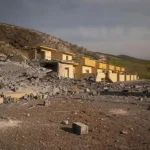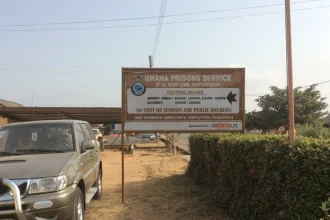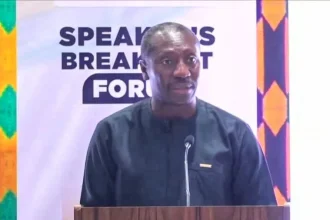Thirteen (13) years after a reckless soldier ran over her legs resulting in it being amputated, a long-suffering trader can now smile as an Accra High Court orders the Ghana Armed Forces and the government to compensate her.
The court ordered that Lucy Bosso be paid GH¢229, 000 for her amputated legs, following injuries she sustained in an accident caused by a soldier.
The soldier at the time of the accident was driving a military vehicle while on official duty.
The accident happened on April 14, 2007 at the traffic intersection on the Liberation Road in Accra, in front of the Naval Guardroom just after the 37 Military Hospital.
In its ruling on May 21, 2020, the court presided over by Justice Kyei Baffour, held that the soldier – Corporal Nlibi Baadah was negligent while driving.
It, therefore, awarded the damages to be paid to the victim, Lucy Bosso.
Government, GAF liable
It was the considered decision of the court that Corporal Baadah was on official duty at the time the accident occurred and therefore, the GAF which was his employer and was a defendant in the case, as well as the Attorney-General (A-G), who represented the government also as defendant in the case, are vicariously liable for his action.
“As 3rd Defendant (Corporal Baadah) is in the employment of the 4th Defendant (GAF) and was not on a frolic of his own, but was on official military duty at the time of the accident, the 4th Defendant is vicariously liable. And being so, the 5th Defendant (A-G) by virtue of Article 88 of the Constitution also becomes liable,” the court held.
Apart from the damages, Justice Kyei Baffour, a Justice of the Court of Appeal with additional responsibility as a High Court judge, further awarded cost of GH¢20, 000 in favour of Ms Bosso.
The judgement was the culmination of a suit filed by Ms Bosso in 2017.
Damages
Breaking the GH¢229,000 down, Justice Kyei Baffour said GH¢10,000 was for Ms Bosso’s medical expenses, GH¢86, 000 for her loss of earnings for the next 18 years which he pegged at GH¢400 per month; GH¢ 43,000 was to pay for Ms Bosso’s domestic caregiver for the next 18 years pegged at GH¢ 200 per month, while GH¢90,000 was general damages for the plaintiff’s pain, mental agony, physical disability and diminished chances of finding a suitable spouse.
“This is to provide hope to victims of road carnage that the State and the justice delivery system will not abandon them in their times of need,” Justice Kyei Baffour said.
Accident
On April 14, 2007, Ms Bosso was travelling from Aflao in the Volta Region to Accra in a commercial vehicle with registration number GR 9204 X.
Court documents show that on reaching the traffic intersection in front of the Naval Guardroom, the vehicle collided with a military vehicle with registration number 33 GA 85 driven by Corporal Baadah which entered the main road from the Naval Guardroom section.
Ms Bosso, who was sitting in the front seat of the commercial vehicle, sustained serious injuries and was rushed to the 37 Military Hospital. Her right leg was later amputated following the crush injuries she suffered.
Suit
Ten years after the accident, Ms Bosso filed a suit in June 2017 at the Accra High Court accusing the driver of the commercial vehicle –Ebenezer Akrong, and Corporal Baadah of negligence which resulted in the accident.
Joined to the suit as defendants were Akrong; the owner of the commercial vehicle, Samuel A Sowah; Corporal Baadah, the GAF and the A-G
She sought damages for “loss of earnings, general and special damages for the injuries she sustained and suffered as a result of the 1st defendant (Akrong) and 3rd defendant (Corporal Baadah)’s negligence resulting in their vehicles colliding”
Also, she sought damages for psychological trauma, and cost including legal fees.
Commercial driver’s defence
In their defence, Akrong and Sowah contended that it was Corporal Baadah’s negligence that led to the accident and, therefore, there was no basis for the plaintiff to join them to the suit as defendants.
Soldier’s defence
On the other hand, Corporal Baadah, GAF and the A-G’s defence was that the accident was as a result of the negligence of Akrong and not Corporal Baadah.
According to them, Corporal Baadah had slowed down to negotiate a turning and that he was halfway onto the main road when the commercial vehicle, driven by Akrong ran into him.
It was their case that if Akrong had applied his brakes, the commercial vehicle would not have collided with the military vehicle.
Also, they argued that the court action by Ms Bosso was statute barred because per Section 3 of the Limitations Act, NRCD 54, an action to recover damages for negligence ought to be brought within three years of the alleged negligent act.
Soldier is negligent
In his judgement, Justice Kyei held that evidence on record including a police report showed that it was Corporal Baadah’s negligence that led to the accident
According to the presiding judge, the traffic light at the intersection was malfunctioning and, therefore, since Corporal Baadah was joining a main road, he should have ensured that he joined the road with caution.
“It is a notorious driving rule known to every average driver that before one enters a main or major road, it should be in such a manner and distance that the vehicle on the main road should not brake to allow the vehicle from the minor road,” Justice Kyei Baffour held.
Driving licence
The court further rejected claims by the GAF and A-G that as a trained soldier, Captain Baadah could not have been negligent.
“With deep respect, this is nothing but a cock and bull story, which can find ready audience on the street but not in a court of law.
“What is even more devastating is that 3rd Defendant (Corporal Baadah) who claims to be in a disciplined force like the military could not produce his driving licence,” Justice Kyei Baffour held.
Statute barred
The court further dismissed the argument by the A-G that Ms Bosso filed the suit out of time.
According to Justice Kyei Baffour, although the action was indeed filed out of time, lawyers for Ms Bosso obtained the permission of another High Court, presided over Justice Daniel Mensah before filing the writ.
















